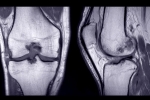ACL Injuries on the Mountain: Next Steps

What are ACL tears?
ACL or anterior cruciate ligament tears occur when the strong band of tissue connecting your shinbone to your thigh bone tears. It might tear partially or entirely. Either way, ACL tears can cause pain, swelling, and the inability to put all of your weight on your knee. Your treatment for an ACL tear depends on the severity of your injury.
What are the symptoms of an ACL injury?
Common symptoms associated with ACL injuries include:
- Decreased range of motion
- Rapid swelling
- Severe pain
- Popping sounds
- Knee weakness
- Instability
Seek treatment at the first sign of a knee ligament injury to reduce the risk of further damage and recover as quickly as possible.
What are the risk factors for ACL tears?
ACL tears can happen to anyone, but some things increase your risk of experiencing them. Examples include:
- Playing sports
- Changing directions
- Pivoting
- Stopping suddenly
- Landing awkwardly from a jump
- Being a woman
- A blow to the knee
- Collisions
- Poor sports training
- Improper footwear or sports equipment
- Playing on artificial turf
Injury prevention includes wearing the correct footwear and proper sports training for strength, flexibility, agility, and balance.
How does my doctor diagnose ACL tears?
To determine if you have an ACL tear and develop an effective treatment, your orthopedic specialist reviews your medical history and symptoms. Then, they evaluate your knee joint and might ask you to move your leg into various positions if you can.
X-rays, MRIs, and ultrasounds help your specialist to determine the root cause of your knee pain.
What are common treatments for ACL tears?
Depending on the severity of your ACL tear, your orthopedic provider might suggest one of the following treatments:
Home remedies
RICE (rest, ice, compression, and elevation) therapy can reduce pain and inflammation after sustaining an ACL injury. You might wear a knee brace while your injury heals.
Physical therapy
Your therapist teaches you exercises that strengthen tissues in your knee joint and reduce the risk of future injuries. You might complete physical therapy instead of surgery or after ACL reconstruction surgery.
Surgery
Surgery is sometimes the best treatment for repairing your ACL to fully restore knee joint function. Your surgeon removes the damaged part of an ACL ligament and replaces it with another type of tissue, such as a tendon. Complete recovery may take as long as a year.
If you have an ACL injury, call the Colorado Sports Medicine and Orthopaedics office or schedule an appointment online today.







